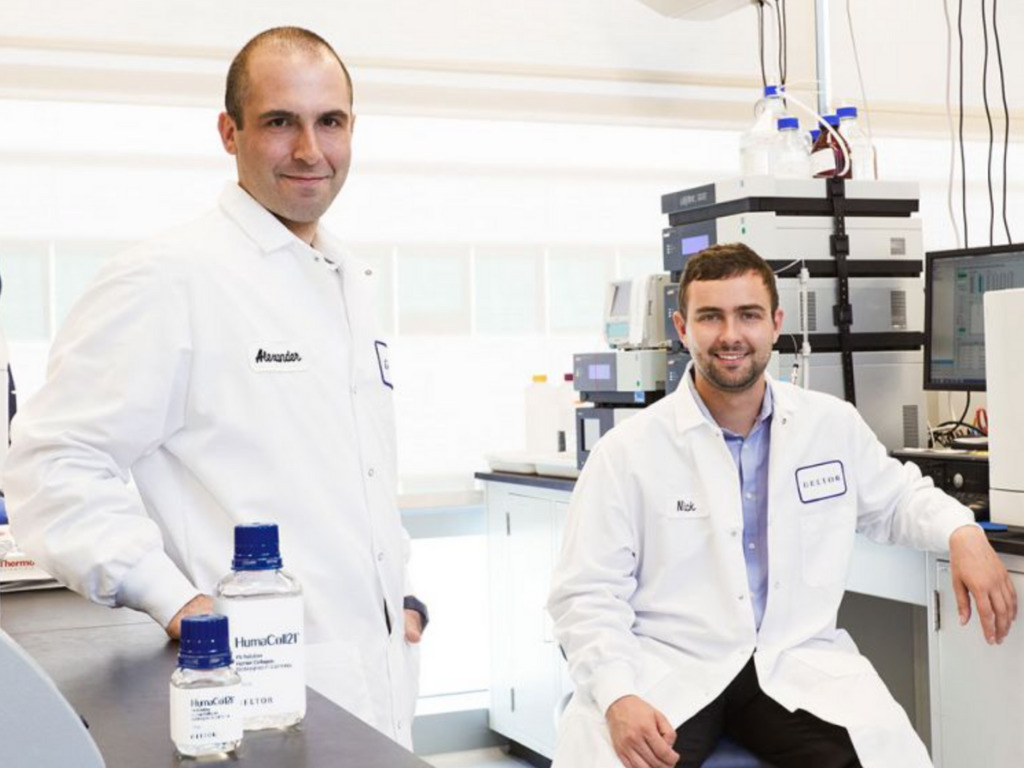3 Mins Read
Biodesign startup Geltor has unveiled PrimaColl, which the company claims is the world’s first real vegan collagen for the food and beverage industry, an exact match for the bioactive amino acid core of Type 21 collagen.
Founded by Alexander Lorestani and Nick Ouzounov in 2015, the San Leandro, California-based Geltor has created a computational biology platform that employs fermentation technology to produce sustainable “designer proteins” that can be used as replacements for animal-based collagen in food products and cosmetics.
In the past, its “ingredients-as-a-service” platform developed cultivated and animal-free collagen replacements like HumaColl21 and Collume.
Now, joining forces with Lonza Speciality Ingredients, the company has created PrimaColl, a ‘beauty-from-within’ brand, which it claims is supposedly different from existing plant-based ‘collagen builder’ or ‘collagen booster’ formulations as it is an exact replica of the bioactive amino acid core Type 21 collagen and is dedicated for use in the F&B industry.
Traditionally, collagen is extracted from animal skin, bones, and connective tissue, with most of it derived from pigs.
Removing the use of animals completely, Geltor said that the new cultivated collagen PrimaColl provides a high potency level in just less volume compared to its traditional counterparts and contains fewer secondary components.
Co-founder and chief technology officer of Geltor Nick Ouzounov said of the new launch: “Like most collagens, natural production of Type XXI decreases into adulthood. The functional collagen core of Type XXI was selected in the biodesign of PrimaColl due to its important role in interacting with other collagen types, and signaling activity for additional collagen production.”

The functional collagen core of Type XXI was selected in the biodesign of PrimaColl due to its important role in interacting with other collagen types, and signaling activity for additional collagen production
Nick Ouzounov, co-founder and chief technology officer of Geltor
In an interview with FoodNavigator, co-founder and CEO Alex Lorestani said that the new product is a premium ingredient relative to other collagens on the market. “Customers love that it’s a Type 21 collagen and therefore a concentrated bioactive, meaning the beneficial effects can be assessed by using less of it in a formulation than you would with animal-derived collagen.”
Lorestani added: “Until now, customers had to rely on plant-based collagen builders, which can be vitamins, minerals, and amino acids – but which aren’t true collagens. Ours is the first real vegan collagen, and a Type 21 collagen, both of which can only be unlocked by our technology.”
He further explained that out of the 28 different types of collages, Type 21 possesses a ‘multiplier-effect’ in signalling to cells leading to the production of additional collagen. Plus, given that it makes up less than 1% of the total collagen found in our body, it is extremely rare in nature.
At the moment, PrimaColl is undergoing a third-party clinical trial.
In July last year, Geltor closed a US$91.3 million financing round to help ramp up its platform, it then launched its animal-free bioidentical human elastin Elastapure for the beauty and personal care industry and in February of this year, the company hired three senior executives to prepare for the launch of its new product in mid-2021.
In a prior interview, business development VP of Geltor, Scott Fabro said: “Collagen is one of the fastest-growing ingredients in the functional food and beverage space and our vegan collagen is not a commodity ingredient. Vegan collagen is for everyone. There’s no dietary restriction, no religious restrictions, and it’s an opportunity for customers to differentiate themselves in the market.”
Elsewhere, Jellatech closed its US$2 million pre-seed round to launch animal-free collagen and gelatin ingredients for F&B, skincare and medical industries. Cellular agriculture firm Avant Meats, focused on cell-cultured seafood, has also gotten involved in the sector with the creation of a cultivated bioactive functional protein called Zellulin to replace the traditional collagen in cosmetics.
Lead image courtesy of Geltor.



